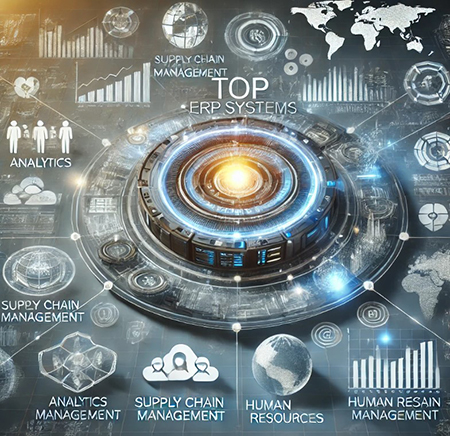Top ERP Systems: Streamlining Business Operations for Success
Enterprise Resource Planning (ERP) systems are a cornerstone of modern business operations. These solutions integrate various functions such as finance, supply chain, human resources, and customer relationship management into a unified platform. This article explores the top ERP systems that are revolutionizing the way businesses operate, their features, and how they drive efficiency and growth.

What is an ERP System?
An ERP system is software designed to centralize and streamline business processes across departments. By providing real-time data and automation, ERP systems enable organizations to improve decision-making, reduce operational costs, and enhance productivity.
Key benefits of ERP systems include:
- Integration: Seamlessly connects various departments.
- Scalability: Adapts to the needs of growing businesses.
- Data-Driven Insights: Provides analytics and reporting to guide strategy.
- Automation: Reduces manual tasks and improves efficiency.
Top ERP Systems in 2025
Here are some of the most prominent ERP systems available, each catering to different business needs:
1. SAP S/4HANA
- Overview: SAP S/4HANA is one of the most advanced ERP solutions, designed for large enterprises. It uses in-memory computing for real-time data processing.
- Key Features:
- Advanced analytics and AI integration.
- Comprehensive financial management tools.
- Support for complex supply chains.
- Ideal For: Large enterprises with global operations.
2. Oracle NetSuite
- Overview: NetSuite is a cloud-based ERP system popular among mid-sized businesses and startups for its flexibility and scalability.
- Key Features:
- Strong financial management capabilities.
- Real-time dashboards for analytics.
- E-commerce and CRM integration.
- Ideal For: Growing businesses seeking a cloud-first solution.
3. Microsoft Dynamics 365
- Overview: Dynamics 365 combines ERP and CRM functionalities, offering a comprehensive solution for businesses.
- Key Features:
- AI-driven insights and automation.
- Seamless integration with Microsoft Office and Azure.
- Flexible modules for different industries.
- Ideal For: Businesses already using Microsoft products.
4. Infor CloudSuite
- Overview: Infor CloudSuite focuses on industry-specific solutions, catering to sectors like manufacturing, healthcare, and retail.
- Key Features:
- Advanced analytics and AI tools.
- Industry-specific modules for specialized needs.
- Scalable cloud infrastructure.
- Ideal For: Industry-specific applications.
5. Epicor ERP
- Overview: Epicor ERP is tailored for manufacturing and distribution industries, providing tools for supply chain optimization and production management.
- Key Features:
- Real-time production monitoring.
- Inventory and warehouse management.
- Cloud and on-premise deployment options.
- Ideal For: Manufacturing and distribution companies.
6. Workday
- Overview: Workday specializes in human capital management (HCM) and financial management, making it a favorite in HR departments.
- Key Features:
- Intuitive HR and payroll management tools.
- Employee performance tracking.
- Cloud-native with mobile accessibility.
- Ideal For: Organizations focusing on HR and finance.
7. Odoo
- Overview: Odoo is an open-source ERP system with customizable modules for businesses of all sizes.
- Key Features:
- Wide range of modules (e.g., CRM, accounting, inventory).
- Open-source flexibility for customization.
- Affordable pricing.
- Ideal For: Small to mid-sized businesses seeking flexibility.
8. Sage Intacct
- Overview: Sage Intacct focuses on financial management and accounting, with robust tools for compliance and reporting.
- Key Features:
- Multi-currency and multi-entity support.
- Comprehensive reporting and dashboards.
- Integration with other business applications.
- Ideal For: Finance-driven organizations.
Choosing the Right ERP System
Selecting an ERP system depends on several factors:
- Business Size: Large enterprises may need the scalability of SAP, while small businesses might find Odoo more suitable.
- Industry Needs: Choose a system with modules tailored to your sector, like Infor for healthcare or Epicor for manufacturing.
- Budget: Open-source options like Odoo are cost-effective, while premium solutions like SAP or Oracle require significant investment.
- Integration: Ensure the ERP system integrates with existing tools and software.
- Cloud vs. On-Premise: Cloud-based solutions are more flexible, while on-premise systems offer greater control.
Future Trends in ERP Systems
As technology evolves, ERP systems continue to advance. Here are some emerging trends:
- AI and Machine Learning Integration: Automating complex tasks and providing predictive analytics.
- IoT Connectivity: Enhancing data collection and real-time monitoring in industries like manufacturing.
- Enhanced User Interfaces: Simplified dashboards and better mobile access.
- Focus on Sustainability: Tools for tracking and managing environmental impact.
- Blockchain for Security: Ensuring data integrity and transparency in transactions.
How ERP Systems Transform Businesses
1. Improved Collaboration
ERP systems centralize data, ensuring all departments work with the same information, reducing silos and enhancing teamwork.
2. Streamlined Operations
Automation reduces repetitive tasks, allowing employees to focus on strategic initiatives.
3. Enhanced Customer Experience
With better data insights, businesses can tailor their services to meet customer needs, improving satisfaction and loyalty.
4. Risk Management
ERP systems provide tools for compliance monitoring, fraud detection, and risk analysis, protecting businesses from unforeseen challenges.
Conclusion
The world of ERP systems offers powerful tools to streamline operations, enhance efficiency, and drive growth. From giants like SAP and Oracle to flexible options like Odoo, there’s a solution for every business size and need. By choosing the right system and embracing modern technologies, businesses can stay ahead in an increasingly competitive landscape.
Investing in the right ERP system is more than a technological upgrade; it’s a strategic decision that can transform the way you do business.